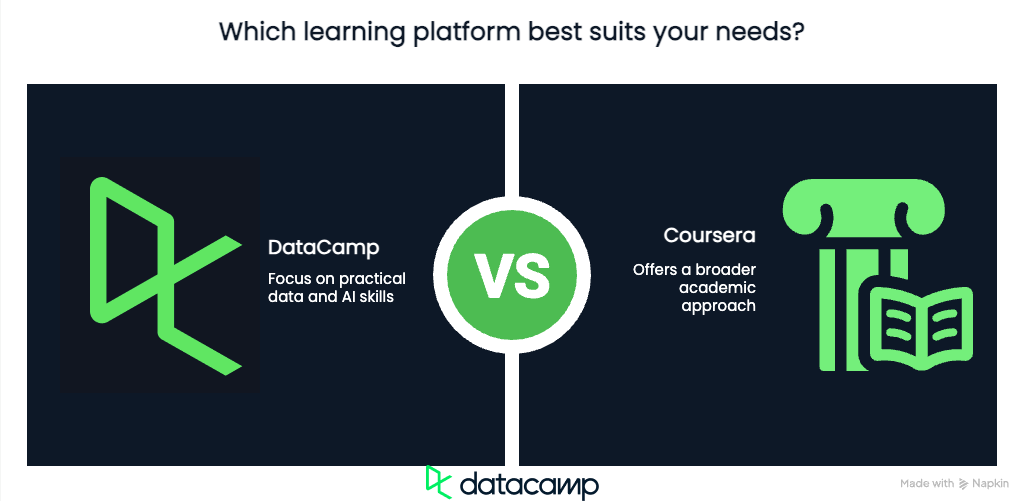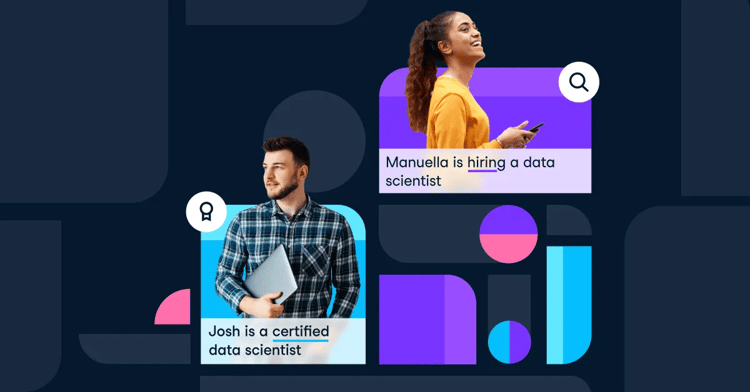Learning new skills is an essential part of your career and personal development. Whether it’s for improving in your areas of inexperience or keeping up with the latest trends in your industry, building your knowledge can be incredibly rewarding. However, with many different learning providers available, finding the one that best suits your needs isn’t always easy.
In this article, we’ll explore DataCamp versus Coursera, two of the big players in the realm of online education. We’ll examine key areas of comparison, including costs, curriculum, certifications, and learning styles. By the end, you should be able to determine which one best suits your needs.
DataCamp vs. Coursera: TL;DR
Both DataCamp and Coursera are excellent learning platforms, albeit they serve different purposes.
If your focus is data science, analytics, or AI, DataCamp is purpose-built for you. It offers interactive, hands-on learning in your browser, guided by real-time feedback and AI assistance.
With one monthly subscription, you get access to a specialized library of courses, skill tracks, and certifications that are constantly updated to reflect the latest tools and technologies, from Python and SQL to generative AI.
Coursera, meanwhile, is a broader academic platform. It partners with universities and organizations to deliver courses across a wide range of disciplines, from business to healthcare to computer science. While Coursera’s data and AI courses are credible, they tend to be more theory-based and less interactive than DataCamp’s.
In short:
- Choose DataCamp for practical, job-ready skills in data and AI.
- Choose Coursera if you’re looking for a more traditional or academic approach across multiple subject areas.

DataCamp Cost vs Coursera Cost
Perhaps one of the most significant factors when determining which provider is right for you is the cost of their service. Both DataCamp and Coursera offer a variety of paid courses as well as some free access. Here’s how the two compare:
|
Free Courses |
Monthly Subscription (US Pricing, subject to change) |
Individual Courses |
Certificates |
Projects |
|
|
DataCamp |
Non-paying users can access the first chapter of each course free. |
Prices start from $14/month for individuals when billed annually. $43/month otherwise. |
Full content library included with Premium at no extra cost |
All certificates and certifications are included in the cost of Premium. |
All projects are included in the cost of Premium. |
|
Coursera |
Offers a range of free and free trial courses across several content areas. |
$59 a month or $399 a year ($33.25/month) |
Varies depending on the course; many are included in the monthly subscription. |
Start at $49 per month |
Start at $9.99 |
DataCamp Curriculum vs. Coursera
Potentially one of the biggest differences between DataCamp and Coursera is in the curriculum offering. DataCamp is highly specialized for learners in the data and AI space.
DataCamp’s focus is on delivering the best skills training for individuals looking to get hands-on with tools like Python, SQL, R, Power BI, and Tableau, as well as get up to speed with new technologies like artificial intelligence, generative AI, and agentic AI.
DataCamp’s curriculum evolves with the industry, so learners always train on the latest AI tools and frameworks, guided by industry experts shaping the field.
In short, DataCamp focuses on:
- Hands-on, interactive, browser-based learning in AI, Python, SQL, R, Power BI, and Tableau
- Fast-updating content aligned with emerging AI tools
- Expert partnerships (Hugging Face, LlamaIndex)
Coursera’s scope is much broader. Although they do have courses in the AI and data space, they don’t have the same depth in these areas. The Coursera catalog has courses in a wide variety of areas such as healthcare, language learning, social sciences, and arts. This breadth means that you can find many different courses on all kinds of topics.
That being said, the curriculum offering is much more generalist with Coursera, while DataCamp is a lot more specialist, focused on data and artificial intelligence skills.
In short, Coursera focuses on:
- Broad academic disciplines across industries
- Conceptual overviews and theoretical depth
Master your data skills with DataCamp
More than 10 million people learn Python, R, SQL, and other tech skills using our hands-on courses crafted by industry experts.

DataCamp vs. Coursera Learning Styles
Everyone learns differently, meaning that you’ll want to choose a platform that has options for your favored style. DataCamp has a range of learning options available, giving you the chance to find a method that works best for you.
Perhaps the standout feature is the interactive and engaging learning environment on DataCamp. In many DataCamp courses, you can create code, solve problems, and get instant feedback on your answers. DataCamp’s AI assistant can help you find the right solution based on your specific answer to a question.
What’s more, through DataLab, DataCamp’s data notebook with built-in AI, you’ll get support on your projects, from beginner to advanced projects.
Whether you prefer short video lessons, guided code-alongs, or hands-on projects, DataCamp helps you learn in the way that fits your life, and turn your new knowledge into real skills. For enterprise customers, you can even get custom learning paths and tailored live training and professional services.
According to their website, Coursera places a priority on “top-quality learning through evidence-based online teaching and learning strategies.” They also emphasize the importance of continuous learning via workshops, knowledge sharing, and creating new content.
Most courses on Coursera use videos and text or image-based instructional material, and there is also the Coursera Coach, which is an AI-powered guide only available to those who have paid for Coursera Plus.
DataCamp Time Commitment vs. Coursera
Fitting your learning in around your schedule can be a challenge. Making sure you allocate enough time to learn while still maintaining a balance in the rest of your life is crucial.
With DataCamp’s interactive learning approach, you build practical skills at your own pace; coding, analyzing, and applying concepts directly in your browser. While individual courses can be completed in a matter of hours, longer career or skill tracks could take you weeks or even months of study to complete.
Ultimately, a large part of the time commitment with DataCamp comes down to you. No matter what your pace is, you’ll have regular refreshers, plenty of interactive exercises to test your skills, and access to a range of projects, webinars, code-alongs, and more to make sure you’re learning the skills at a rate that’s comfortable.
|
Category |
DataCamp |
Coursera |
|
Learning Pace |
Self-paced, with interactive lessons and instant feedback |
Self-paced, though some courses have suggested deadlines |
|
Typical Course Duration |
Individual courses: a few hours; Career/Skill Tracks: weeks to months |
Projects: 1-2 hours; Courses: a few hours; Specializations: 1–6 months |
|
Long-Term Programs |
Certifications with set completion windows |
Degrees lasting 2-4 years, depending on the subject |
|
Flexibility |
Fully flexible; learn anytime, progress at your own speed |
Flexible but with more structured academic timelines |
|
Learning Format |
Hands-on coding, practice exercises, and short lessons that fit into small time blocks |
Primarily video-based learning that requires longer attention spans |
|
Time Management Support |
In-platform reminders, progress tracking, and refreshers |
Suggested deadlines and weekly targets, but not enforced |
Coursera offers a range of learning experiences. While projects can take just 1-2 hours on average, courses can take a few hours, while specializations and certificates can take 1-6 months.
Coursera also offers degrees, starting from $9,000, which can take 2-4 years to complete, depending on the subject. Many of Coursera’s offerings do have suggested deadlines, though they’re not enforced. With DataCamp, there are time limits for Certifications, meaning once you’ve started, you have to complete the assessment within a set amount of time.
DataCamp vs. Coursera AI and Data Specializations
We’ve touched on this already, but there is quite a difference between Coursera and DataCamp when it comes to their AI and data specializations.
DataCamp very much focuses on building data and AI skills for every skill level. You’ll find all kinds of courses on core themes, topics, and concepts, as well as more detailed tracks that give you all the skills you need to specialize in a particular field, for example, the Associate AI Engineer for Data Scientists.
The curriculum content is focused on data-centric technologies as well as data and AI literacy, making it the ideal choice for learners who are either just getting started with these skills or who are looking to further their expertise in the latest tools. DataCamp has partnered with several notable players in the AI space, such as Hugging Face, LlamaIndex, and more
Coursera’s strength is in the breadth of its offering. They have a wide variety of courses across multiple disciplines, including data and AI, as well as computer science, business, arts, humanities, and more.
Their selection of advanced AI courses focuses mainly on broader concepts rather than specific technologies, although they do offer courses in partnership with some big names in the tech space.
DataCamp Certifications vs. Coursera
Both Coursera and DataCamp offer industry-recognized certifications. DataCamp's certifications have been designed with industry experts, allowing you to prove that your skills are job-ready in a variety of disciplines.
As well as career-focused certifications for data analysts, data scientists, and data engineers, there are also technology-specific qualifications for SQL, Power BI, Tableau, Azure, Alteryx, Python, AWS, and KNIME.
These certifications are all backed by thorough courses and tracks, meaning that you can master critical skills designed by leaders in data and AI education.
Similarly, Coursera’s professional certificates are training courses and programs that can help equip learners with specific skills in a particular subject area. Many are industry- or skill-based and backed by industry names.
Much like DataCamp’s certifications, they can help you bridge the gap between academic education and practical skills.
Earn a Top AI Certification
DataCamp vs Coursera: Which to Choose?
Ultimately, the choice between DataCamp and Coursera comes down to what you want to learn and how you prefer to learn.
If you’re starting or developing a career in data science, artificial intelligence, or analytics, DataCamp is the more focused and effective choice.
The DataCamp platform is designed to get you coding, experimenting, and applying concepts in real time. With structured learning paths, industry-recognized certifications, and a constantly evolving library that keeps pace with the latest tools and AI developments, you’re able to learn in the way best suited for you. For teams, DataCamp for Business features make it easy to scale upskilling initiatives with measurable results.
However, for those looking to explore a wider variety of academic subjects, such as healthcare, social sciences, and arts, Coursera offers more diversity. With a range of university-backed courses and degree programs, it’s well-suited for learners who want more lecture-style content from academic institutions.
For most professionals looking to develop or advance their technical skills in the realms of data science and AI, DataCamp offers a more direct, interactive, and outcome-driven learning experience. It’s designed to go beyond just teaching you concepts, but to help you apply them immediately in your work.

A senior editor in the AI and edtech space. Committed to exploring data and AI trends.



